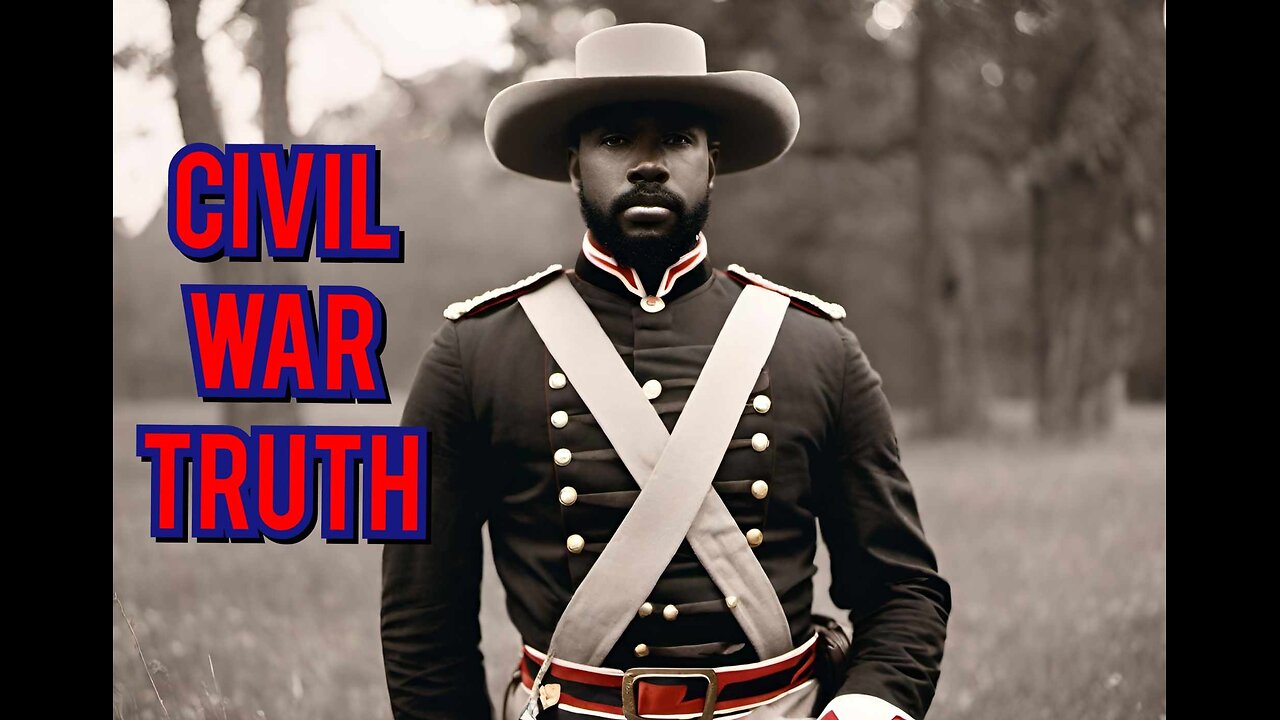Premium Only Content

American Civil war Truth , Independence from the crown, It Never was about freeing the slaves,
Southern leaders during the Civil War era placed the responsibility for the outbreak of conflict squarely on President Lincoln's shoulders. They accused him of acting aggressively towards the South and intentionally provoking war with the aim of overthrowing the Confederacy. In contrast, the Confederacy sought a peaceful resolution to assert its rightful claims to independence and only resorted to defensive measures when confronted by Lincoln's coercive policies.
Confederate Vice President Alexander H. Stephens asserted that the war was initiated by Mr. Lincoln. While he acknowledged that General Beauregard's troops fired the initial shot, Stephens argued that the true instigator of conflict is not the one who strikes first, but rather the one who makes force necessary.
Stephens identified the commencement of hostilities as Lincoln's order to dispatch a "hostile fleet," referred to as the 'Relief Squadron,' to reinforce Fort Sumter. According to Stephens, the war began at that moment, as the authorities in Washington took this action. General Beauregard refrained from opening fire on Fort Sumter until he knew this fleet was very near Charleston's harbor. He had also asked Major Anderson if he would commit to not participating in the anticipated attack from the approaching fleet. When Major Anderson refused to make such a promise, General Beauregard found it imperative to strike first to prevent his forces from being caught in a crossfire.
Jefferson Davis, who shared a similar perspective with Stephens, contended that Fort Sumter rightfully belonged to South Carolina after secession. The Confederate government had made earnest efforts to reach a fair settlement with the federal government. However, Davis argued that these efforts were thwarted when Lincoln dispatched a hostile fleet to Sumter. He emphasized that depicting the Confederacy as the aggressor was unjust, likening it to the fable of the wolf accusing the lamb.
From Davis's viewpoint, allowing the fort to be reinforced, even through peaceful means, was unacceptable. It would mean maintaining a perceived threat to Charleston. Additionally, there was no guarantee that Lincoln would honor his commitment to only resupply the fort, with no intention to reinforce it in the future. Thus, the attack on Sumter was viewed as a defensive measure. To have allowed the fort's reinforcement, even at the risk of firing the first shot, would have been as unwise as refraining from defending oneself when faced with a lethal threat.
In the twentieth century, this critical interpretation of Lincoln's actions gained popularity through the writings of Charles W. Ramsdell and others. Ramsdell argued that the situation at Sumter presented Lincoln with a series of dilemmas. Taking action to retain the fort would alienate the border South and a significant portion of northern sentiment that sought reconciliation with the South. On the other hand, abandoning the fort would jeopardize the Union by legitimizing the Confederacy. Lincoln also risked losing support within his own Republican Party and appearing as a weak and ineffective leader.
However, Ramsdell posited that Lincoln could navigate these challenges if he could goad Southerners into attacking Sumter, thus putting them in the wrong in the eyes of both the North and the world. By dispatching a relief expedition, ostensibly to provide sustenance to a beleaguered garrison, Lincoln shifted the dynamics, compelling the Confederates to decide whether to allow the fort's reinforcement or to take aggressive action. Through this strategic maneuver, Lincoln effectively maneuvered the South into firing the first shot.
American Civil war Truth , Independence from the crown, It Never was about freeing the slaves,
#mikemartins #mikeinthenight
Confederacy,President Lincoln,Southern Leaders,Fort Sumter,Alexander H. Stephens,Jefferson Davis,Civil War Causes,War Perspectives,Historical Analysis,Economic Factors,Tariffs,Transportation,Industrialization,Labor Relations,Banking and Finance,Northern Economy,Southern Economy,Infrastructure,Urbanization,Population Growth,Political Tensions,Economic Divide,Historical Controversy,19th Century History,Historical Narratives,Charles W. Ramsdell,Border South
-
 1:46:17
1:46:17
Mike Martins Channel
7 days ago $0.55 earnedMike in the Night E616 - Crusades 2.0 in Europe, More Ukraine Money Laundering, Israel keeps bombing
3586 -
 4:39:32
4:39:32
Barry Cunningham
8 hours agoBREAKING NEWS: PRESIDENT TRUMP IS GOING TO TAKE CHICAGO! LFG!!! (IT'S MOVIE NIGHT!)
90.8K63 -
 1:23:59
1:23:59
Man in America
10 hours agoTrump Demands Big Pharma Come Clean on Covid Shots w/ Dr. David Martin
43.5K36 -
 1:40:27
1:40:27
megimu32
5 hours agoOTS: Labor Day Sitcom Blowout - Tim, Ray, & Relatable Chaos!
36.6K5 -
 4:09:30
4:09:30
StevieTLIVE
6 hours agoWarzone Wins w/ FL Mullet Man
32.1K1 -
 1:04:01
1:04:01
BonginoReport
9 hours agoLefties Wish Death on Trump but He’s BACK! - Nightly Scroll w/ Hayley Caronia (Ep.125)
194K83 -
 3:18:28
3:18:28
Tundra Tactical
6 hours ago $3.49 earnedWe Survived the Military… But Not This Basement
38.3K -
 20:12
20:12
Clownfish TV
14 hours agoDisney Needs MEN Back?! They ADMIT Star Wars and Marvel are DEAD!
28.3K40 -
 1:37:00
1:37:00
Anthony Rogers
13 hours agoEpisode 381 - Tim Kelleher
19K1 -
 1:01:42
1:01:42
The Nick DiPaolo Show Channel
11 hours agoTDS Hits New Level! | The Nick Di Paolo Show #1786
56.4K41